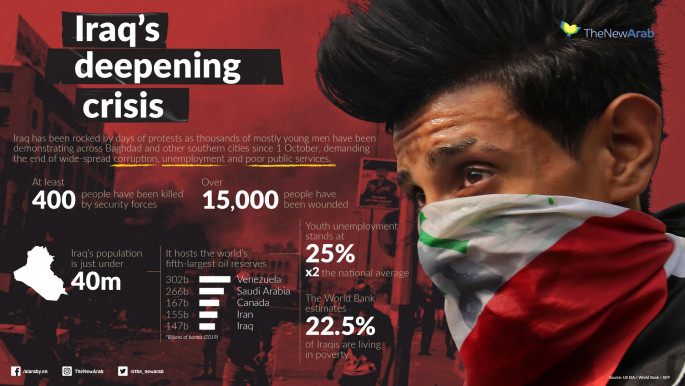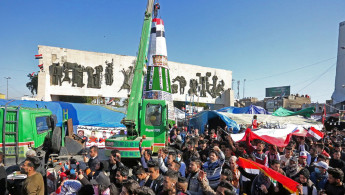Follow us on Twitter and Instagram to stay connected
Baghdad protesters build Iraqi flag Christmas tree in show of national solidarity
Protesters in Iraq's capital city have built a Christmas tree made from flags in tribute to the country's Christians as anti-government protests rage on.
3 min read
The Christmas tree was made up of Iraq flags [Getty]
Protesters in Baghdad have built a Christmas tree made from Iraqi flags in a show of solidarity with the Christian people of Iraq, who had previously cancelled Christmas celebrations in the city to show solidarity with the anti-government movement.
The tree represents "love and peace," protester Issa Saad told The Associated Press.
Saad said that it was built to "show solidarity with our Christian brothers, and also to celebrate the birth of Jesus".
He added that the protesters wanted to celebrate the holiday but felt that it was tinged with sadness due to the loss of hundreds of young people in ongoing protests in Baghdad.
At least 425 people have died since the leaderless uprising shook Iraq on 1 October.
"This tree represents love and peace. And we wanted to celebrate with a new style, but with sadness, of course. This tree is a tree of Iraqi flags and represent all types of people in Iraqi society,” Saad went on to say.
“Of course, this is to show solidarity with our Christian brothers, and also to celebrate the birth of Jesus".
Christmas 'cancelled'
Last week it was announced that there was to be no Christmas tree in Baghdad as Iraq’s Christian population lent their support to anti-government protests.
Instead of tinsel and baubles, a tree in the middle of a central Baghdad plaza occupied by anti-government protesters has been decorated with portraits of those killed by security forces earlier this month.
The tribute, demonstrators explained to the Washington Post, was to honour the decision made by Christian leaders to cancel the festivities, and instead remember all the people who died.
During a recent visit to Tahrir Square, Cardinal Louis Raphael Sako, of the Chaldean Church in Iraq said "a new Iraq is being born".
"Now there you feel you are Iraqi," he told AP.
Demands for electoral reform
The warm gesture came as thousands of protesters blocked roads and bridges across southern Iraq on Monday, condemning Iranian influence and political leaders who missed another deadline to agree on a new prime minister.
Anti-government demonstrators burned tires in major cities across the south, forcing the closure of schools and government buildings, AFP correspondents reported.
Politics in the region remain fraught as negotiations over a candidate to replace premier Adel Abdel Mahdi, who quit in November in the face of protests against corruption and unemployment, remained deadlocked as the Sunday deadline expired.
While a pro-Iran camp has tried to impose a candidate, Iraqi President Barham Saleh has reportedly put up resistance.
Demonstrators announced civil disobedience campaigns in the southern cities of Diwaniyah, Nasiriyah, Hilla, Kut and Amara, closing public buildings and blocking roads "on orders of the people".
"We are upping our actions because we oppose any candidate from the political class that has been robbing us since 2003," said Ali al-Diwani, a young protester in Diwaniyah.
Protesters are calling on an overhaul of the political system, and they say it has to begin with electoral reform.
"What we want is simple: a prime minister who is competent and independent, who has never been involved with the ruling parties since 2003," said Mohammed Rahman, a protesting engineer in Diwaniyah.
Protesters say they want a first-past-the-post system to "guarantee a new generation could enter politics to clean up everything the ruling parties have corrupted," Rahman told AFP.
Since 2003, a complicated mix of proportional representation and candidate lists has favoured major parties and the heads of those lists.
Saad said that it was built to "show solidarity with our Christian brothers, and also to celebrate the birth of Jesus".
He added that the protesters wanted to celebrate the holiday but felt that it was tinged with sadness due to the loss of hundreds of young people in ongoing protests in Baghdad.
At least 425 people have died since the leaderless uprising shook Iraq on 1 October.
"This tree represents love and peace. And we wanted to celebrate with a new style, but with sadness, of course. This tree is a tree of Iraqi flags and represent all types of people in Iraqi society,” Saad went on to say.
“Of course, this is to show solidarity with our Christian brothers, and also to celebrate the birth of Jesus".
|
Christmas 'cancelled'
Last week it was announced that there was to be no Christmas tree in Baghdad as Iraq’s Christian population lent their support to anti-government protests.
Instead of tinsel and baubles, a tree in the middle of a central Baghdad plaza occupied by anti-government protesters has been decorated with portraits of those killed by security forces earlier this month.
The tribute, demonstrators explained to the Washington Post, was to honour the decision made by Christian leaders to cancel the festivities, and instead remember all the people who died.
During a recent visit to Tahrir Square, Cardinal Louis Raphael Sako, of the Chaldean Church in Iraq said "a new Iraq is being born".
"Now there you feel you are Iraqi," he told AP.
Demands for electoral reform
The warm gesture came as thousands of protesters blocked roads and bridges across southern Iraq on Monday, condemning Iranian influence and political leaders who missed another deadline to agree on a new prime minister.
Anti-government demonstrators burned tires in major cities across the south, forcing the closure of schools and government buildings, AFP correspondents reported.
Politics in the region remain fraught as negotiations over a candidate to replace premier Adel Abdel Mahdi, who quit in November in the face of protests against corruption and unemployment, remained deadlocked as the Sunday deadline expired.
While a pro-Iran camp has tried to impose a candidate, Iraqi President Barham Saleh has reportedly put up resistance.
Demonstrators announced civil disobedience campaigns in the southern cities of Diwaniyah, Nasiriyah, Hilla, Kut and Amara, closing public buildings and blocking roads "on orders of the people".
"We are upping our actions because we oppose any candidate from the political class that has been robbing us since 2003," said Ali al-Diwani, a young protester in Diwaniyah.
Protesters are calling on an overhaul of the political system, and they say it has to begin with electoral reform.
"What we want is simple: a prime minister who is competent and independent, who has never been involved with the ruling parties since 2003," said Mohammed Rahman, a protesting engineer in Diwaniyah.
Protesters say they want a first-past-the-post system to "guarantee a new generation could enter politics to clean up everything the ruling parties have corrupted," Rahman told AFP.
Since 2003, a complicated mix of proportional representation and candidate lists has favoured major parties and the heads of those lists.
 |





 Follow the Middle East's top stories in English at The New Arab on Google News
Follow the Middle East's top stories in English at The New Arab on Google News

![22 Arab countries at COP29 have rejected the targeting of fossil fuels [Getty]](/sites/default/files/styles/image_330x185/public/2024-11/GettyImages-2184289638.jpg?h=199d8c1f&itok=ptHl5bec)
![Dozens of people turned out for the funerals [Getty]](/sites/default/files/styles/image_330x185/public/2024-11/GettyImages-2185229760.jpg?h=e7c891e8&itok=1bctDcE6)